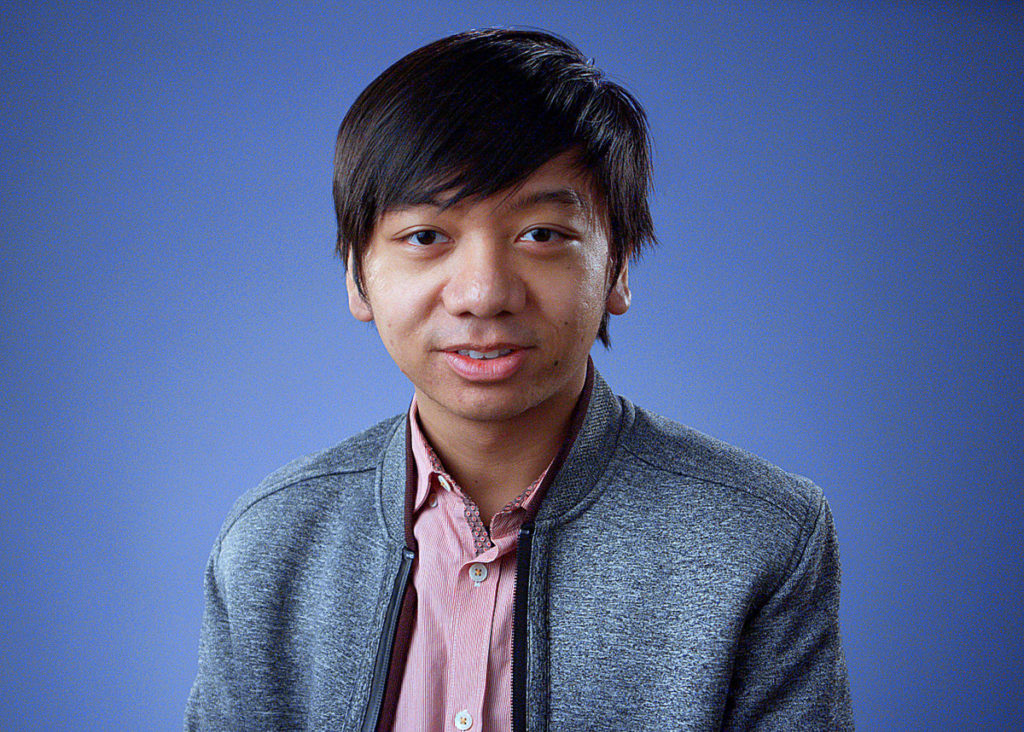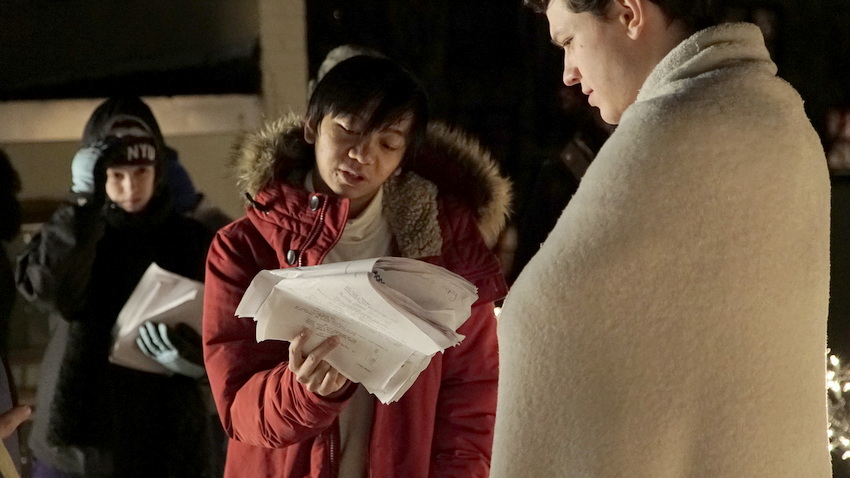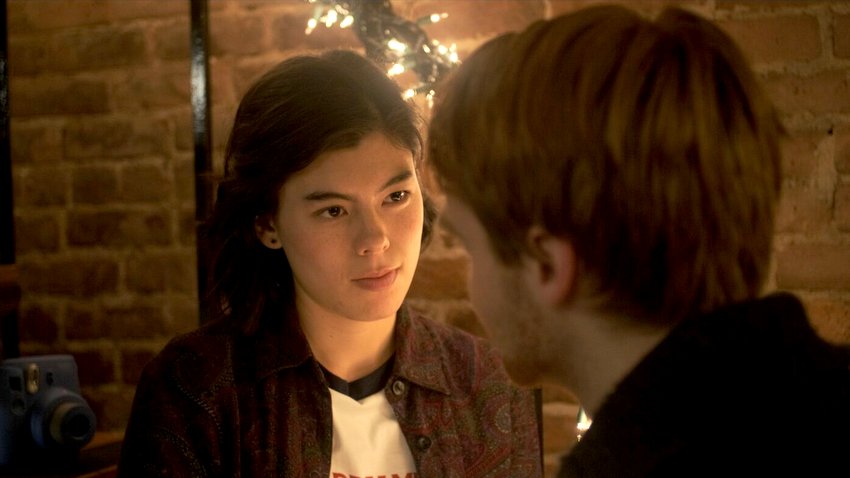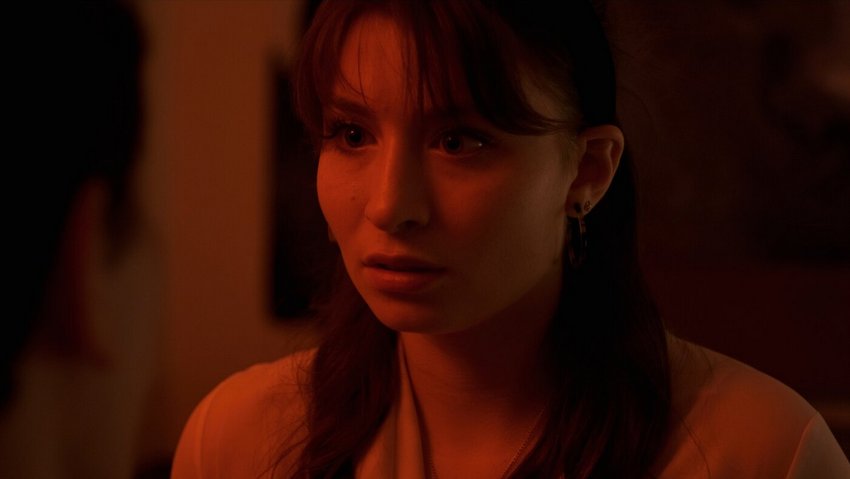
Julian Santos is an independent filmmaker living and working in New York City. Originally from San Francisco Julian directs and shoots narrative, documentary and commercial work in both long and short-forms. His film Last Party (2019), is touring the festival circuit. Julian reveals the work on his feature debut…
indieactivity : Give a background of your personal experience with the story, writing, production and marketing
Julian Santos : The creative story of my film, Last Party, actually begins in London in 2017, where I came up with the idea
to tell a very honest story about romance in your early 20s, featuring three couples and set at one party. I created the first 115-page draft of Last Party in a weekend.
But, after that weekend, we spent a year tweaking the script. I bought on board co-writer Kevin Nittolo and we showed it to other filmmakers, as well as some actors, in order to get some feedback regarding coherence and flow. I didn’t come up with the idea to tell the story in a non-linear order until we were two months off from principal photography. (The film keeps replaying the party from the perspective of each couple).
When January 2019 came; we spent 21 days shooting the film. We only had two (to recall accurately) one-day breaks during the production and it felt we were running a marathon. We then proceeded to post-production: editing, color grading and sound mixing. This process peaked in November, then the movie was relatively complete (bar a few tweaks). Additional photography took place early 2019 after the first edit (dailies) was immediately assembled.

indieactivity : Did you start writing with a cast (You or any) in mind?
Julian Santos : Despite the fact that I think casting is 100% essential, Last Party wasn’t actually written with any particular actors in mind. About 8 months before shooting started, we casted for a read-through of the script. Seeing the core six characters read out loud for the first time really informed the co-writer and I what these people really sounded like. Two of these actors wound up acting in the finished film.
We held a rigorous set of auditions, sorting through over 1,000 applicants and seeing about 250 in person over the course of 8 audition sessions. Each of the six lead actors had to go through 3-4 rounds of auditioning each before being selected.
But, once they were chosen, each person really helped the characters develop, contributing a great deal to their characters and the story in general over the course of three months of rehearsals.
indieactivity : How long did you take to complete the script? (Do you have a writing process?)
Julian Santos : The first draft of the script was finished in a weekend, but the rewriting process took a year. Because the piece was a very naturalistic drama, we wanted to make sure the dialogue as well as the character’s behaviors sold as real. A read-through helped, with us getting valuable insight from actors and filmmakers. But, the script evolved in rehearsal and (sometimes) even as we shot multiple takes of a scene.
indieactivity : When did you form your production company – and what was the original motivation for its formation?
Julian Santos : City Bear Media started when my film partner-in-crime/editor/roommate, Benjamin Goebel, and I figured that, if we didn’t start taking charge of producing our own content, we may never make narrative films beyond college. We saw our peers get sucked up into their day jobs and never pursue their dreams.

So, we made content, even if our films were low budget. Two shorts preceded Last Party. Eventually, we formed a stable of crew, who could reliably shoot and complete short films outside the safety net of college.
indieactivity : What was the first project out of the gate?
Julian Santos : While Last Party was the end-game, with the script already being revised and rewritten when we founded City Bear Media, our first project was actually a short film called Six Feet After. It taught us a lot about dealing with production logistics without NYU backing you. A lot of the crew who worked on that returned for Last Party, and it was a really great confidence boost to do before jumping into a feature film.
indieactivity : During production, what scene (that made the cut) was the hardest to shoot?
Julian Santos : One of the hardest scenes takes place after one of the couples, Charlie and Laura, has sex with each other for the first time. It’s complicated since Charlie is realizing he already has feelings for his best friend, Caroline. This was one of two scenes that we reshot during additional photography, and the reshot version is what you see in the finished cut.
The first version of the scene just lacked a lot of warmth and connection, feeling detached and clinical despite the fact that the two literally just had sex. Originally, I assumed Charlie would feel awkward since he had feelings for someone else, but it really just made the scene feel nonsensical. The reshot scene has a better sense of conflict: Charlie is attracted to Laura despite knowing he’s in love with Caroline. Furthermore, Laura, not suspecting anything is wrong until the end of the scene, should really be utterly smitten with Charlie, excited about this step in their relationship.
It goes without saying that the intimate nature of the scene made it even more challenging. Ultimately, we really rehearsed the reshot (and rewritten) version before shooting it. Both actors, Samantha and James, did a fantastic job with this one. The scene had a lot of beats, and they landed all of them. The scene is probably one of my favorites in the movie. Here’s a clip:
indieactivity : What works better in this latest production that mightn’t have worked so well in the last one you did?
Julian Santos : On this production I had a better visual control of the overall piece. This really comes down to the talent behind the camera. My DP, Maxwell Geoffrey, is really creative and technically proficient. So, he and I collaborated to give this film a distinctive visual look. I wanted all the film to be handheld, evoking a very naturalistic feel, but, at the same time, Max chose all these colorful practical lights which really helped the film feel cinematic. The Fuji XT3 was a wonderful camera, and FujiFilm sent us a second rig to use in some scenes for free. I was actually looking at my original moodboard, and we really nailed that look.
indieactivity : You produced and directed the film, what measure of input did it take to don these hats?
Julian Santos : Oh god, don’t do it. It’s like triple the work. That’s not to say I didn’t get a tremendous amount of assistance from my other producers, Scottie Schwefel and Troy Enoka. Scottie was especially helpful in her candid creative input. But, at this level with no big “studio” support, you as the director/producer are ultimately accountable for the shoot being able to happen, and, for example, if the production designer bails the day before the shoot (actually happened!), the burden is on you to fix that even if you couldn’t have anticipated or prevented it. Hopefully, next project, I’ll be able to solely direct.
indieactivity : Is there anything about the independent filmmaking business you still struggle with?
Julian Santos : Honestly, the thing I struggle with the most is that you can’t actually make that many projects per year on this level. It’s just pretty financially prohibitive if you want to adhere to a decent standard of polsih, and, if all of your regular crew and cast are balancing day jobs, then it’s hard to find the time to generate fresh, creative stories. In an ideal world, I’d be making a short film every month, but that’s a very difficult goal. I hope that, as I hone my craft and/or get more outside support, that this becomes easier.

indieactivity : Where do you think your strengths line as a filmmaker?
Julian Santos : I think my two biggest strengths are rehearsal and the willingness to admit when something isn’t working.
I really believe in getting the actors familiar and involved with the material, so, for a 90 page script, we rehearsed for two months. Even casual audience members can detect good chemistry, and we had to nail down the chemistry of three core couples.
I’m good about cutting scenes with my editor Ben Goebel. This movie could have been 2 hours but, honestly, that material was unnecessary. I also am open to either reshoot a scene or add an additional scene to clarify the overall narrative. I’m not precious about adhering completely to my vision, and I see additional photography as part of the process. If major Hollywood films need to do it, then why shouldn’t we?
indieactivity : Let’s talk finance, How did you finance the film?
Julian Santos : The film was largely made through crowdfunding. I know that you really only get “one big ask” of most of your friends and family, so I never relied on crowdfunding before. We had an Indiegogo page. I was very thankful that a lot of people believed in this film and helped make it a reality.
indieactivity : Did you go over budget? How did you manage it?
Julian Santos : Surprisingly for an indie feature, we didn’t go over budget! An old professor of mine told me “Prep ‘til you puke” and we really did our due diligence on pre-production. One very crucial thing was to extensively plan our meals. 21 days is a lot of meals, and we struck bargains with restaurants to offer us reasonable package deals. I found that a lot of owners were very understanding and, honestly, excited to help with a movie set!
indieactivity : How important is marketing? Do you think a project can make any dent without it these days?
Julian Santos : Marketing is definitely very difficult on the micro-budget indie level, and a lot of that responsibility again falls to you as the director/producer. Word of mouth goes a long way, and you should get every cast/crew member ready to spread the word. Maintaining social media is also pretty crucial if you want people to notice your project. But, at the end of the day, you’d be surprised how infectious your own excitement for a project can be.
indieactivity : Can you tell us about your marketing activities on the project – and how it’s gone for you?
Julian Santos : I think we’ve done all right in terms of marketing. It was really helpful to have a poster and a trailer. Both things are crucial to summing up your film to strangers. It was also very fortunate that we got a review so early on into our festival run. As a (relatively) cynical person, I was happily surprised that people were willing to help spread the word about the movie and even interested in my experiences making it.
indieactivity : What do you hope audiences get from your film?
Julian Santos : You know, I really just hope that the audience finds the story equally entertaining and realistic. We worked hard to make the film feel very real, and I hope that’s paid off. Moreover, the thing that I love about ensemble pieces is that everyone in the audience ends up connecting with a different character. I’d like to believe that we developed each of our core 6 enough that each has its little fan base among viewers.
indieactivity : What else have you got in the works?
Julian Santos : I’m currently working on two feature screenplays with my co-writer on this, Kevin Nittolo.
The first screenplay is entitled “Eating and Drinking.” It’s a very stripped-down naturalistic romance that follows the relationship of a young couple in New York. It’s very much in the vein of “Last Party.”
The second is “Inkblack”: this period piece horror movie set in the 1960s! This story of demonic possession takes place in a small town at a Catholic college. It’s got a really unique vibe to it, almost Twin Peaks-esque at places. Obviously, as a period piece, it does require a lot of funding and we’re looking for people to help with that.
That said, we made a 10-minute proof-of-concept film for “Inkblack” entitled “The Spellbook.” Luckily, that short has been chosen to be part of a larger anthology horror film entitled “Ghosts.” That movie, produced by Tony Newton, is coming to DVD and VOD later this year, so hopefully people can check that out!
Tell us what you think of the interview with “name“. What do you think of it? What ideas did you get? Do you have any suggestions? Or did it help you? Lets have your comments below and/or on Facebook or Instagram! Or join me on Twitter @oladapobamidele
Follow Julian Santos on Social Media
Website
IMDb
Facebook
LinkedIn
YouTube
Vimeo
Richard Green Documentary, ‘I Know Catherine, The Log Lady’: Premiere in NYC, LA May 9th
Lynchian Doc I Know Catherine, The Log Lady Makes Hollywood Premiere 4/17, Rollout to Follow
In Camera by Naqqash Khlalid Launch on VOD April 29
Naqqash Khlalid’s Directs Nabhan Rizwan. In Camera stars an EE BAFTA Rising Star Award Nominee.
2025 Philip K. Dick Sci-Fi Film Festival Award Winners Announced
Vanessa Ly’s Memories of the Future Awarded Best PKD Feature
Dreaming of You by Jack McCafferty Debuts VOD & DVD for April Release
Freestyle Acquires “Dreaming of You” for April 15th Release
Hello Stranger by Paul Raschid set for London Games Festival & BIFFF
The film Is set for an April 10th Premiere at The Genesis Cinema in London (LGF) and BIFFF
Daydreamers Official Trailer by Timothy Linh Bui: Released by Dark Star Pictures
Daydreamers Vietnamese Vampire Thriller – May 2nd release









